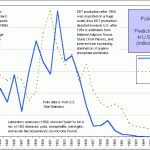polio
Massive is the misinformation promulgated by the antivaccine movement, and many are its lies. For example, antivaxers claim that, in some way or other, vaccines cause autism, autoimmune diseases, sudden infant death syndrome (SIDS), cancer, and a wide variety of other conditions and diseases when there is no credible evidence that they do and lots of evidence that they don’t. One of the favorite tropes used by antivaxers to frighten parents out of vaccinating their children is known as the "toxins" gambit, in which antivaxers cite lists of scary-sounding ingredients in vaccines like…
Last summer, Nigeria celebrated having gone a year without a case of polio. But then last month, just before meeting the two-year mark, two children in Nigeria were diagnosed with polio paralysis, and a third case has now been detected. All three cases are in Borno state (in northeastern Nigeria) in areas liberated from Boko Haram militants. NPR's Jason Beaubien reports:
Dr. Chima Ohuabunwo, an epidemiologist who has been working with the U.S. Centers for Disease Control and Prevention in Nigeria for the past five years, says Boko Haram has cut off parts of Borno state, in Nigeria's northeast…
There's a delightful meme going around Facebook right now, featured above, that portrays five African women, fists raised, all wearing aprons proclaiming "Kick out polio!" Accompanying the meme is a message from the American Academy of Pediatrics celebrating that yesterday marked one full year since the last case of polio was recorded on the continent of Africa and praising African leadership in executing successful vaccination campaigns against this dread disease, in particular recent declarations in support of eradication from the African Union Heads of State Summit and the Organization of…
Last week, Nigeria met an important milestone: An entire year without a reported case of polio. If the WHO confirms the absence of the virus in samples taken from people in previously affected areas, Nigeria will no longer be on the list of countries where the disease is endemic. Another two years will have to pass without additional cases before the WHO can certify Nigeria -- and possibly the entire continent of Africa -- as polio-free.
India was in a similar position a few years ago: In 2012, it was removed from the list of polio-endemic countries, and the WHO declared it polio-free in 2014…
Being a new parent is exhausting. All of a sudden, you're out of the hospital and on your own with this amazing, tiny human, and you alone are responsible for her care. You're given reams of paperwork about feeding and sleeping, developmental milestones, red flags to look out for. You're inundated with information you barely have time to look at. Mom is trying to heal from childbirth while barely sleeping, while her partner is trying to pick up the slack and pitch in as much as possible. You both fumble with the car seat, thinking that NASA must have equipment that's easier to figure out. You…
A few of the recent pieces I've liked:
Andrea Elliott in the New York Times: Invisible Child: Dasani's Homeless Life
Matthieu Aikins in Wired: The Surge: "In 1988 there were 350,000 cases of polio worldwide. Last year there were 223. But getting all the way to zero will mean spending billions of dollars, penetrating the most remote regions of the globe, and facing down Taliban militants to get to the last unprotected children on Earth."
Maryn McKenna at Superbug: MRSA in UK Turkeys Raises Questions of Communication, Transparency and Risk
Elizabeth Weise in USA Today: Diseases on the move…
The Internet has produced a revolution with respect to information. Now, people anywhere, any time, can find almost any information that they want, as long as they have a connection to the global network and aren't unfortunate enough to live in a country that heavily censors the Internet connections coming in. In addition, anyone any time can put his or her opinion out on the Internet and it might be read by people on the other side of the planet. For example, it continually amazes me that my blatherings here are read by people in Australia and New Zealand, as well as Europe and pretty…
Earlier this week, a UN official told AFP that a child in North Waziristan, Pakistan had contracted polio -- the first reported case since tribesman in North Waziristan stopped authorities from conducted a vaccination campaign in June last year. AFP explains:
The Taliban alleged that the campaign was a cover for espionage.
Efforts to tackle the highly infectious disease have been hampered over the years by local suspicion about vaccines being a plot to sterilise Muslims, particularly in Pakistan's conservative and poorly educated northwest.
"We are worried because this new case comes as an…
It's time for this year's second installment of student guest posts for my class on infectious causes of chronic disease. First one this year is by Dana Lowry.
Humans have a long history of illness and death from infectious diseases. It wasn’t until the 1790s that we had a solution. Edward Jenner recognized that milkmaids never contracted smallpox but suffered from a more mild disease, cowpox. Jenner took pus from a cowpox lesion on a milkmaid’s hand and placed it in an incision he made in an eight year-old boy’s arm. He then exposed the boy to smallpox; the boy didn’t contract the disease,…
A few of the recent pieces I've liked:
Tim Dickson in Rolling Stone: The NRA vs. America
Tammie Smith of the Richmond Times-Dispatch and Reporting on Health: Where you live determines how long you live
Leah Garces at Food Safety News: Why We Haven't Seen Inside a Broiler Chicken Factory Farm in a Decade (via this Superbug post, which has links to more related stories)
Charles Kenney at Small World (Businessweek): How the CIA is Hurting the Fight Against Polio
Sarah Kliff at Wonkblog (Washington Post): How Ohio's Republican governor sold the state on expanding Medicaid
Twenty years ago, President Clinton signed the Family and Medical Leave Act, which many workers still rely on to assure that they can return to their jobs after taking unpaid time off for a new baby or to deal with a serious illness - their own or a family member's. But, NPR's Jennifer Ludden reports, 40% of the workforce is ineligible for the leave, including those working fewer than 25 hours per week with an employer (even if they have multiple part-time jobs), workers at businesses with fewer than 50 employees, and those who want to care for a family member who doesn't meet the official "…
Pakistan is one of only three countries where polio is still circulating (Afghanistan and Nigeria are the others), and its eradication efforts have just encountered a horrific setback: Over the course of 48 hours, gunmen shot and killed eight vaccination workers in and around Karachi and Peshawar. The United Nations has pulled off the streets all staff involved in the polio vaccination campaign. Jibran Ahmad reports for Reuters that the government is nonetheless determined to continue immunization efforts:
Karachi police spokesman Imran Shaukat said teams were supposed to tell police of their…
Celeste wrote earlier about an excellent series of investigative stories on the resurgence of black lung disease among US coal miners. If you missed any of them when they first came out, they are:
“Dust reforms stalled by years of inaction” and “Miners say UBB mine cheated on dust sampling,” by Ken Ward Jr., Charleston Gazette
“Black lung surges back in coal country,” by Chris Hamby, iWatch News (Center for Public Integrity)
“As Mine Protections Fail, Black Lung Cases Surge” and “Black-Lung Rule Loopholes Leave Miners Vulnerable,” by Howard Berkes, NPR (and more from NPR on black lung here…
No matter how you slice it, I've been at this blogging thing a long time. it's been over seven years now. It's been even longer than that, though, because before that cold gray Saturday afternoon in September when I started farting around with Blogger and ended giving birth to the first iteration of Respectful Insolence, I had been sparring with quacks, cranks, and various other promoters of pseudoscience for at least five years before. Even after all that time, however, it's humbling and amazing to contemplate that I haven't seen it all, no matter how much at times I might feel that I have.…
The Oklahoman just had a really interesting article up on polio support groups in Oklahoma City:
Oklahoma City polio support group helps residents understand disease
I freely admit to forgetting the real-world side of my research, at times. Especially for diseases like polio, which have been eradicated in my country since before I was born-- my study/interest in them is purely academic. Its not 'real' anymore-- its a very interesting chapter in a history book.
This article was enlightening. Polio is not just something that happened long ago in a galaxy far, far away. There are people who…
The World Health Organization has confirmed that India has gone a whole year without having a new case of polio -- a major milestone in a country that was once plagued by the crippling disease. BBC's Fergus Walsh explains that the country won't formally be regarded as polio-free until it's gone another two years without a case of the disease, but reaching the one-year mark is still an occasion for celebration. In an earlier piece, Walsh describes the massive polio vaccination effort that has allowed the country to achieve this success; India's government partnered with the World Health…
A few of the recent pieces I've liked (or, in the case of the first item, found horribly disturbing but important):
Maryn McKenna at Superbug: Ringing the Warning Bell: Colistin-Resistant Klebsiella
J. Malcolm Garcia in Guernica: Smoke Screen ("In Afghanistan, the U.S. military disposes of garbage--computers, motorbikes, TVs, shoes, even human feces--in open burn pits. Are toxic clouds from these sites making everyone sick?" Bonus: Celeste is quoted in the article.)
The New York Times' Room for Debate: Could Farms Survive Without Illegal Labor?
Helen Branswell at the Pulitzer Center on Crisis…
Mark Pendergrast writes: To kick off this book club discussion of Inside the Outbreaks, I thought I would explain briefly how I came to write the book and then suggest some possible topics for discussion.
The origin of the book goes back to an email I got in 2004 from my old high school and college friend, Andy Vernon, who wrote that I should consider writing the history of the EIS. I emailed back to say that I was honored, but what was the EIS? I had never heard of it. I knew Andy worked on tuberculosis at the CDC, but I didn't know that he had been a state-based EIS officer from 1978…
Student guest post by Ron Bedford.
The first week of February 2010 must have been some sort of Post Polio Syndrome (PPS) week. The New York Times ran a story about PPS on February 2nd.
On the following Saturday, during the broadcast of the 2009 AKC/Eukanuba National Championship dog show, a Labrador Retriever named Benton was honored with an AKC Humane Fund Award for Canine Excellence (ACE) in the service category for his work as an assistance dog for his owner, Margo Dietrich, a polio survivor who "lives with physical limitations due to experiencing adult-onset Post Polio Syndrome".
Since…
At the beginning of the 20th century, a traveler in Central Africa made mention of some strange people that he had come across. He was traveling among regular, run-of-the-mill natives...probably Bantu-speaking people living in scattered villages and farming for their food. But along the way, strange people came out of the forest. These strange people had sloping foreheads; they were short of stature, bow-legged and otherwise misshapen. They also clearly were, in the eyes of the traveler, of subhuman intelligence. The traveler described these people as a separate, subhuman race that lived in…




